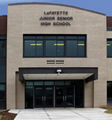American Rescue Plan
Federal Stimulus Funding Plan
ARPA-ESSER Funding Plan
The 2021-22 enacted state budget includes language requiring local education agencies, such as school districts, that receive funding from the Federal Elementary and Secondary School Emergency Relief Fund allocated by the American Rescue Plan Act of 2021 (ARPR-ESSER) to post on its website a plan by school year of how these funds will be spent.
Printable version of our plan including communication for public comment
The 2022-23 Enacted State Budget includes language requiring local education agencies, such as school districts, that receive funding from the Federal Elementary and Secondary School Emergency Relief Fund allocated by the American Rescue Plan Act of 2021 (ARPA-ESSER) to post on its website an updated plan of how these funds will be spent. New York has been allocated nearly $9 billion in ARPA-ESSER funds, with a minimum of $8.09 billion (90 percent) going to local education agencies, including public schools. LaFayette Central School District has been allocated $2,664,146.
Of this total, $$983,136 of the ESSER3 funds are earmarked specifically for the District to address learning loss. $168,007 is reserved for summer enrichment, and $168,007 is reserved for after-school programs. The remaining $1,344,996 can be used for other allowable uses within the grant.
Districts are required to prioritize spending on non-recurring expenses in the following areas:
- Safely returning students to in-person instruction;
- Maximizing in-person instruction time;
- Operating schools and meeting the needs of students;
- Purchasing educational technology;
- Addressing the impacts of the COVID-19 pandemic on students, including the impacts of interrupted instruction and learning loss and the impacts on low-income students, children with disabilities, English language learners, and students experiencing homelessness;
- Implementing evidence-based strategies to meet students' social, emotional, mental health, and academic needs;
- Offering evidence-based summer, afterschool, and other extended learning and enrichment programs; and
- Supporting early childhood education.
In addition, districts must identify programs and services that will continue beyond the availability of these federal funds and how local funds will be used moving forward in order to minimize disruption to core academic and other school programs.
Below is our spending plan.
Our plans for non-recurring expenses in the area of maximizing in-person instruction time: We will be conducting summer school at each building this year. We will be creating afterschool programs to allow for more individualized instruction when needed, with a late afternoon bus run to accommodate student/parent schedules. We will have teachers on special assignment acting as instructional specialists to be another resource for the teachers and students throughout the day.
Our plans for non-recurring expenses in the area of operating schools and meeting the needs of students: We will be purchasing cleaning supplies, equipment, and PPE to keep the schools clean and safe for our students. We will be investing in our HVAC systems to ensure we have proper ventilation, filtration, etc. We will be purchasing classroom furniture to update and modernize the classroom settings.
Our plans for non-recurring expenses in the area of purchasing educational technology: We will be purchasing chromebooks to maintain our 1:1 ratio. Ongoing training will take place with teachers to maintain and enhance skills utilizing new and existing software. We will be using a company to test our computer security and recommend enhancements to avoid down time or infiltration by an unauthorized person(s). This will include more training with staff on handling spam email requests, etc. Throughout the pandemic, the district provided hot spots for many district residents since there is no broadband available on the Nation.
Our plans for non-recurring expenses in the area of addressing the impacts of the COVID-19 pandemic on students, including the impacts of interrupted instruction and learning loss and the impacts on low-income students, children with disabilities, English language learners, and students experiencing homelessness: We will be conducting summer school at each building this year. We will be creating after-school programs to allow for more individualized instruction when needed, with a late afternoon bus run to accommodate student/parent schedules. We will have teachers on special assignment act as instructional specialists to be another resource for the teachers and students throughout the day.
Our plans for non-recurring expenses in the area of implementing evidence-based strategies to meet students' social, emotional, mental health, and academic needs: We are partnering with Onondaga County to have a social worker on site and have other resources readily available if needed. They will work in tandem with our counselors to ensure students are receiving the guidance needed and can refer them to other supports if necessary. There will continue to be a focus on professional development in the area of mental health within the district. There is also an opportunity to have more speakers addressing students regarding mental health issues, etc.
Our plans for non-recurring expenses in the area of offering evidence-based summer, afterschool, and other extended learning and enrichment programs: We will be conducting summer school at each building this year. We will be creating after-school programs to allow for more individualized instruction when needed with a late afternoon bus run to accommodate student/parent schedules. We will have teachers on special assignment act as instructional specialists to be another resource for the teachers and students throughout the day. Tutoring will be available as needed. There is also an opportunity to have more speakers addressing students regarding mental health issues, etc.
Our plans for non-recurring expenses in the area of supporting early childhood education: We will continue to enhance our existing universal pre-K program to support learning opportunities for this age group. The district recently reviewed the ELA curriculum and has invested heavily into professional development on the science of reading instruction. The district will continue to invest in early literacy and early learning skills to help make sure that students have the school readiness skills that they need to be successful.
The following programs will continue beyond the availability of federal funds and we will use the following local funds in order to minimize disruption to core academic and other school programs: We plan to maintain the summer school and after-school programs as much as possible. Many costs were non-recurring and will not need to continue beyond the funding time period. The district will continue to maintain local funding efforts to make sure that the academic, social, emotional, and mental health needs of our students are addressed as we navigate these challenging times.
Links to Proposed Budgets for Federal and State Projects with amendments (FS-10 and FS-10A)
Elementary and Secondary School Emergency Relief Programs Governor’s Emergency Education Relief Programs (ESSER and GEER) Grant Period March 2020 - September 2022CARES Plan
ESSER FS10 and FS10F
GEER FS10 and FS10F
Coronavirus Response and Relief Supplemental Appropriations (CRRSA) Act Grant Period December 2020 - September 2023
CRRSA Plan
- ESSER II Narrative
- ESSER II FS-10
- ESSER II FS-10A Amendment #1
- ESSER II FS-10A Amendment #2
- ESSER II FS-10A Amendment #3
- ESSER II FS-10F
- ARP ESSER
- ARP ESSER State Reserves Plan
- Lost Instructional Time
- After School
- Summer Enrichment





